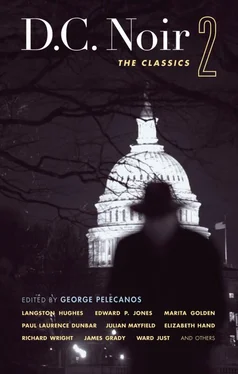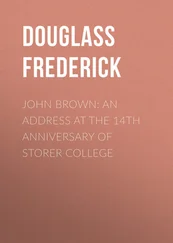“I’ll make it an hour and a half.”
“I appreciate it. Friend.”
“Just keep the door closed, and I’ll know you’re still here if I get back too early.”
So I left, half-angry, half-sad. There was a bar down the street that had a color television set. I hadn’t been in the bar in six weeks, but it was empty as usual and I took a seat at the far end, backed up against the wall, and drank draft beer for two hours. I thought I had better give them all the time they needed. While I sat and drank beer I thought about Nora and how she would handle it. It occurred to me that there were a hundred jobs in Washington that the senator could get, all of them close to the — what did they call it? — “the center of events.” There were jobs in this town other than elective ones. Editing newsletters. Influence peddling. I began to think of him as an undersecretary of state or an assistant secretary of defense. Depending, of course, on how messy the divorce was. Whether or not the press picked it up. Well. No adulterers in the Pentagon. But as I sat and drank the beer, I understood that the speculations didn’t matter. What mattered was Nora, and how she saw it. She’d staked out her territory and was a very determined woman. She loved him, so she understood him, and she understood Washington, too; that was the essence of it. It seemed to me that the way she had constructed her argument made retreat impossible.
The night baseball game ended, and I was alone in the bar. The barman and I were watching the late news. There was film from Saigon and a report on the West Coast dock strike. We were chatting quietly, and then the barman moved off to serve a late arrival who had taken a table in the rear. I was preparing to go, when I caught the last of a sentence from the television announcer: “… the senator and his wife had been married for fourteen years.” There was no more, but I knew they were talking about Nora’s man. I turned to go and saw him then, at the table in the rear of the room, near the color television set. He was staring into his drink, a stricken look on his face. He hadn’t taken off his overcoat, its khaki collar concealed his cheeks and jaw. He was almost as big as I am, hunched over the table in the overcoat, his hat on the chair beside him. He stared at the drink and clicked the ice with his finger, apparently unconscious of the surroundings. I turned back to the bar and in a moment I left, leaving a five-dollar bill and walking straight out the door.
I ran up the street to the brownstone, let myself in, and sprinted up the stairs to the second floor. The door was partly ajar, and I could hear Bunk Johnson’s blues inside. Nora was sitting on the couch, a drink in front of her, staring at the bookshelves.
“He’s gone now,” she said. She waited a moment, concentrating, then went on. “He made an announcement tonight; he and his wife are separating. He prepared an announcement, a press release. He and his staff. Is that what you do in Washington? If you decide to get a divorce, leave someone’s bed, do you first prepare an announcement to give to the newspapers? Before you’ve packed, said good-bye?”
“If you’re a senator, I guess you do.”
“Television, too, I suppose.”
“I guess so. I heard it on the news ten minutes ago.”
“I suppose you’d want the largest possible distribution, no part of America ignorant of any personal fact. Do you suppose he’ll have a briefing for the wire services? Off the record? Deep background, perhaps. Lindley Rule with a release date?” She’d begun to cry.
“Nora, Nora.”
“No need,” she said.
“Well, he thought there was.”
“Yes, he did. He did he did he did.”
“How was he when he left?”
“He didn’t like it,” she said.
“It isn’t the worst thing I’ve ever heard a man do.”
“No, not the worst. Unless you regard futility as an offense. Or ignoring other people’s feelings. Or your own … your own sense of yourself. To destroy a part of yourself, what you are, what you have, in obedience … to some stupid …”
I wanted to say something to shock her. “How can you be so goddamned sure?”
It was then that she made the remark about romantics dead and dying, although as I look back on it now, that can be taken two ways. In any case, the senator was duly divorced, and Nora got her assignment abroad. I didn’t see her again for six years, when I was in London on a holiday and rang her up and we had lunch at the Ritz. It was an elegant lunch, and we talked about everything but that. I was waiting for her to bring up the subject and I suppose she was waiting for me. But there was nothing to be said about it, at that late date. Nothing useful or illuminating or constructive. But I could never tell her, then or later, that I’d seen him that night in the bar, hunched over the table, staring at the glass, clicking the ice cubes with his fingernail. In light of everything since, she’d been right as rain.
Our bright tomorrows
by Larry Neal
(Written circa 1973)
Georgia Avenue
Martin Luther King was dead.
A gloom descended upon me; and it was as if my body was outside of me like some kind of haunting shadow.
One night during that semester I dreamed I saw my ghost drifting across the campus toward me like a puff of stream. My face drifted above the stream. And although I knew it was my ghost, my face was without definition.
I followed the ghostly twin to a crossroads.
“On one side of this road,” I thought I heard her say, “there is a river of blood. On the other side there is a river of milk. Life could not exist without either. You will have to choose. But there is pain always …”
And now in the cool spring air, I made my way across the campus to the Arts and Humanities building. I liked this time of evening best. Now I would have access to the practice room where I could play what I wanted without the vulgar intrusions and comments of Dr. Reed, who was the chairman of the music department.
I would hang around the library and try to work on my paper on the history of the violin in the development of European music. Needless to say, I found all of that quite boring. Did you know that from 1600 to 175 °Cremona was the center for great violin making? And that Antonio Stradivari was Nicolò Amati’s pupil? Yes, it was boring like Dr. Reed, who must have been teaching this course since the days when this university was five shacks by a dirt road which later came to be called Georgia Avenue. His note cards were frayed and dirty, and he affected a kind of gay British accent.
I was never good at writing papers, but I somehow managed to get by with good grades. In my senior year, I found it harder and harder to work. I was feeling disconnected, a little batty even. And now the death of Dr. King, my hero. It was, nonetheless, my last year. I would have to bear down.
I tried taking notes from Petherick’s book on Antonio Stradivari, but after fifteen minutes into it, I found it hard to stay awake. I would doze off, and then suddenly jerk myself awake like one of these junkies down on U street. This can’t go on.
I played my scales and exercises. Then I worked on the piece by Schumann. I worked hard until I had built up a sweat. But I stumbled through the Hindemith, and finally gave up on the Bartók.
Outside, there was a large crowd of students clustered around the big oak tree just opposite the library. A notoriously controversial student by the name of Jennie Forman was speaking through a white bullhorn. The campus police were there almost in full strength. She wore a high bushy Afro; and she had on an army jacket with red, black, and green epaulets. She must have been quite popular with the male students, because there were a lot of good-looking brothers guarding her.
Читать дальше











